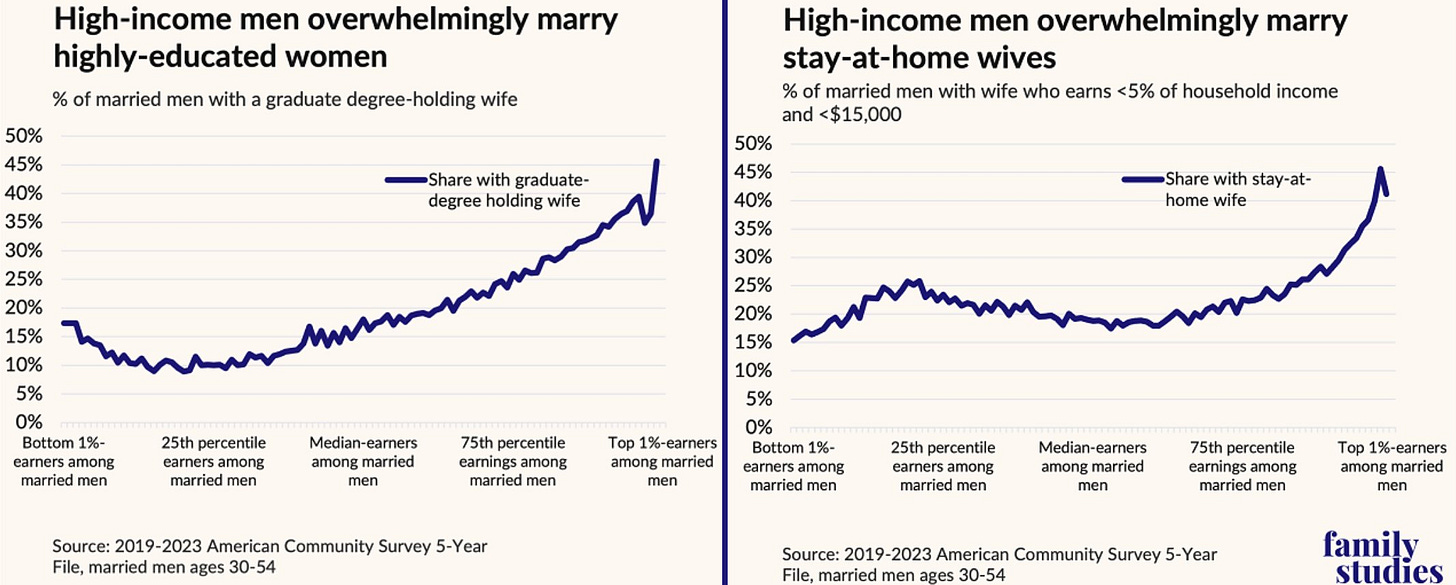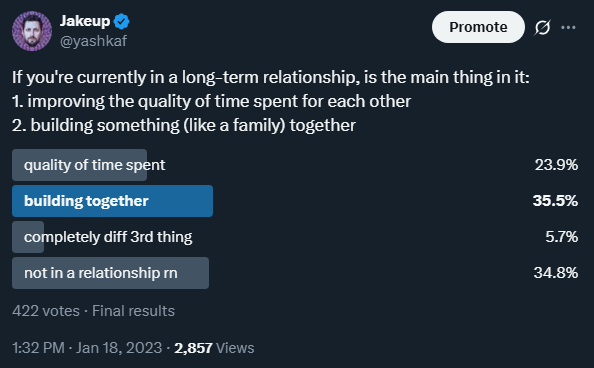The Couple as Firm
Tits or ass? Bro, her operational range
Trophies
A persistent topic of “the discourse” is whether rich, successful men want to marry the overeducated girlboss or the simple tradwife. Most contributions to this discourse consist of the airing of class grievances, but sometimes somebody bothers to collect some actual data. Turns out, rich men want to marry the overeducated tradwife.
One spin on this is that men want a trophy wife to show off to their friends. In 2025, trophiness is measured in advanced degrees and venture funding, not just in waist-to-hip. This belief is mostly held by two subsets of educated women: those who never liked men and don’t expect to marry them, and those who feel that being a trophy wife sounds lovely and chill, actually.
Successful people in actual marriages, like Simon Sarris, think of it a bit differently:
I somewhat dislike this common line, “want to take these women out of the workforce". My wife and I run a small firm together (our family). There are many things to get done, lots of delegation. One of the tasks is "go get money" so I also have a job […] "on the side". That's what 99.9% of jobs are. It's fundraising for the bigger thing, which is my family and my life.
Men want educated, talented, and agentic wives for the exact same reason they want educated, talented, and agentic business cofounders. The real prize isn’t the credentials your wife accumulated in the few years before you married, but what you’ll build together in the decades after.
Entertainment
A couple of years ago, I wrote about couples that build together vs. couples that entertain each other. Most people got the premise intuitively, and 60% of those in relationships chose the building path.
Even though most people want to build together, almost everyone inadvertently selects for entertainment only:
A woman wants a husband to have 3 kids with in a house with a picket fence. So she goes to the bar with 10 strangers off an app and picks the one who’s most charming after three drinks…
This extends to “data-driven” matchmaking. OkCupid tried to assess a compatibility score but mostly ended up measuring lifestyle similarity since the majority of questions were about hobbies and culture war signaling. My friends in NYC ran a matchmaking project based on a survey of 400 questions that correlated for friends and roommates.
But roommates aren’t building anything. Some people discover this by trying to date their roommates. I went in the unexpected direction: after Natasha and I broke up over our incompatibility as partners, we lived together for over a year in a small apartment. We could never raise a family together, but we were perfectly capable of providing each other with pleasant company.
Good roommates are predicted by similarities: shared politics and religion, homebody vs. party-animal lifestyle, similar circadian rhythms and music tastes and tolerance for mess in the kitchen. But no one picks a startup cofounder who’s identical to them. You want to be aligned on the vision, but have complementary skills that cover everything a business needs to thrive. It’s the same for the family firm.
Alignment
People have a decent idea of the things a couple should agree on before tying the knot: children, geography, monogamy, frugality, sex, in-laws, house plants. Above these specifics, there’s a governance layer that’s often left unspoken: How flexible or rigid are you going to be about all these topics? How conservative or ambitious? How will you prioritize them against each other? Is marriage a sacred duty, or a pragmatic strategy?
Are you here for self-fulfillment, or to build?
My post on the two types of couples was inspired by a friend couple. While my wife and I were clearly building, their marriage was oriented towards and sustained by entertainment and quality time. A short while after I published my post, they divorced.





